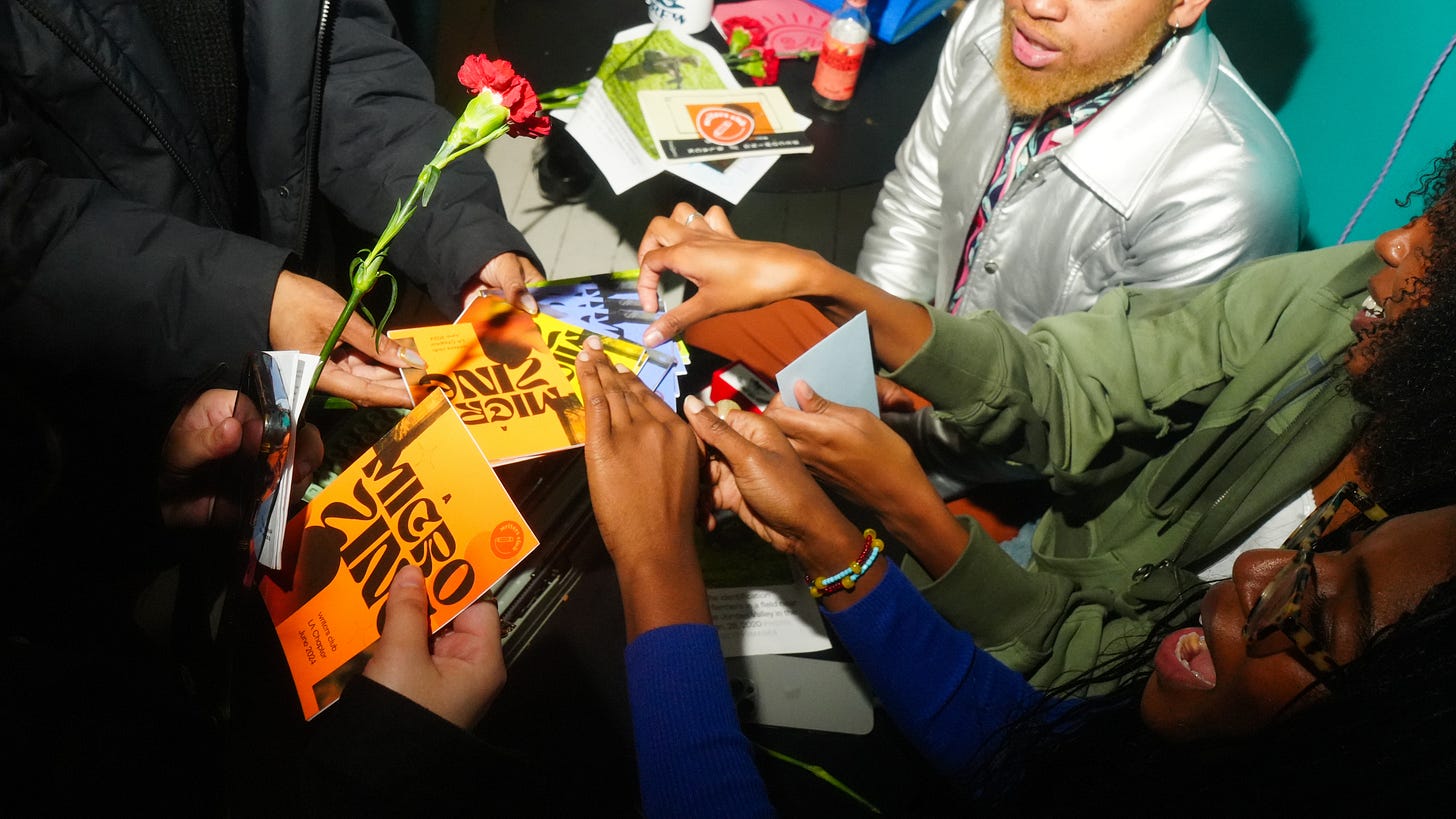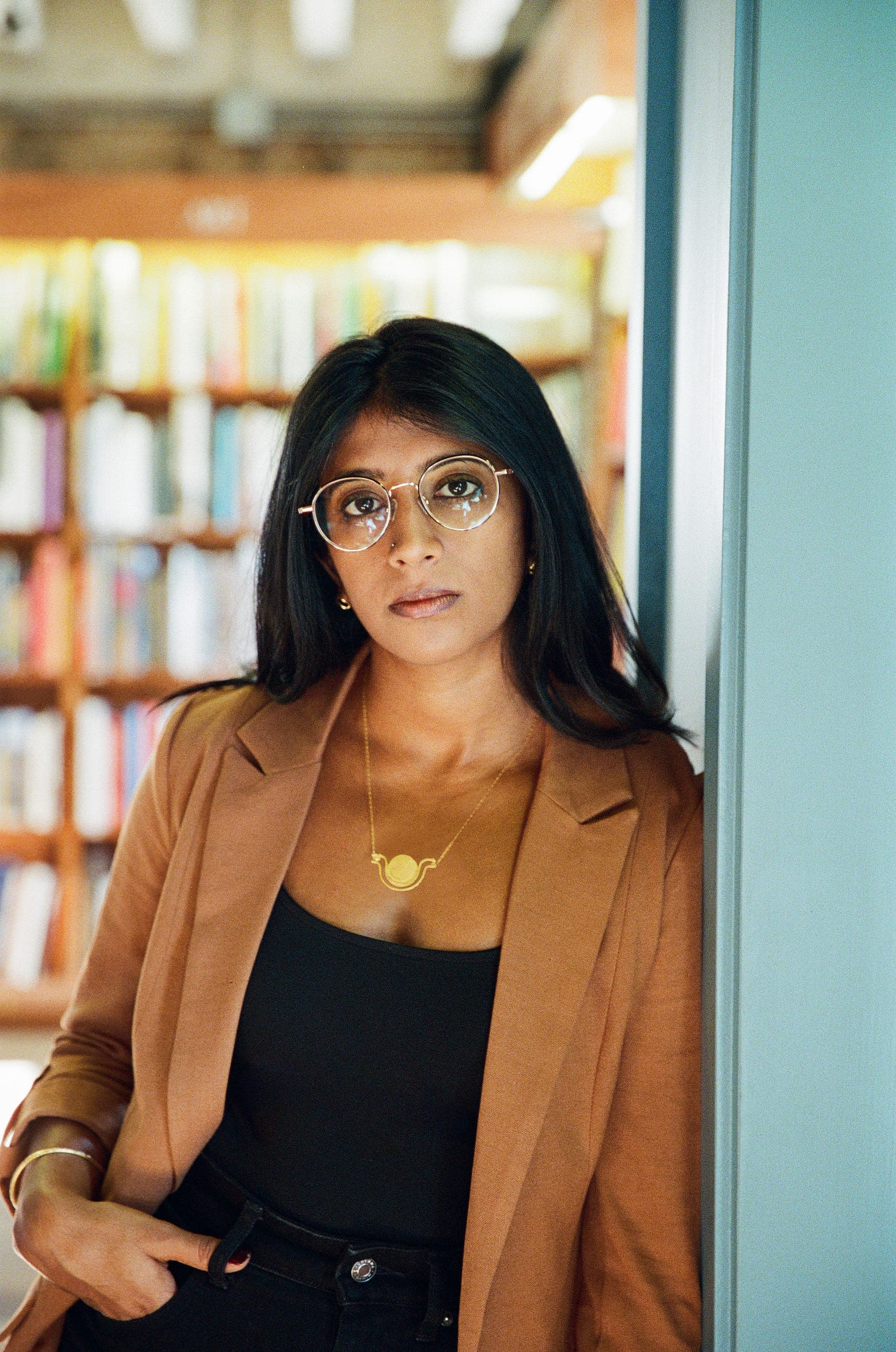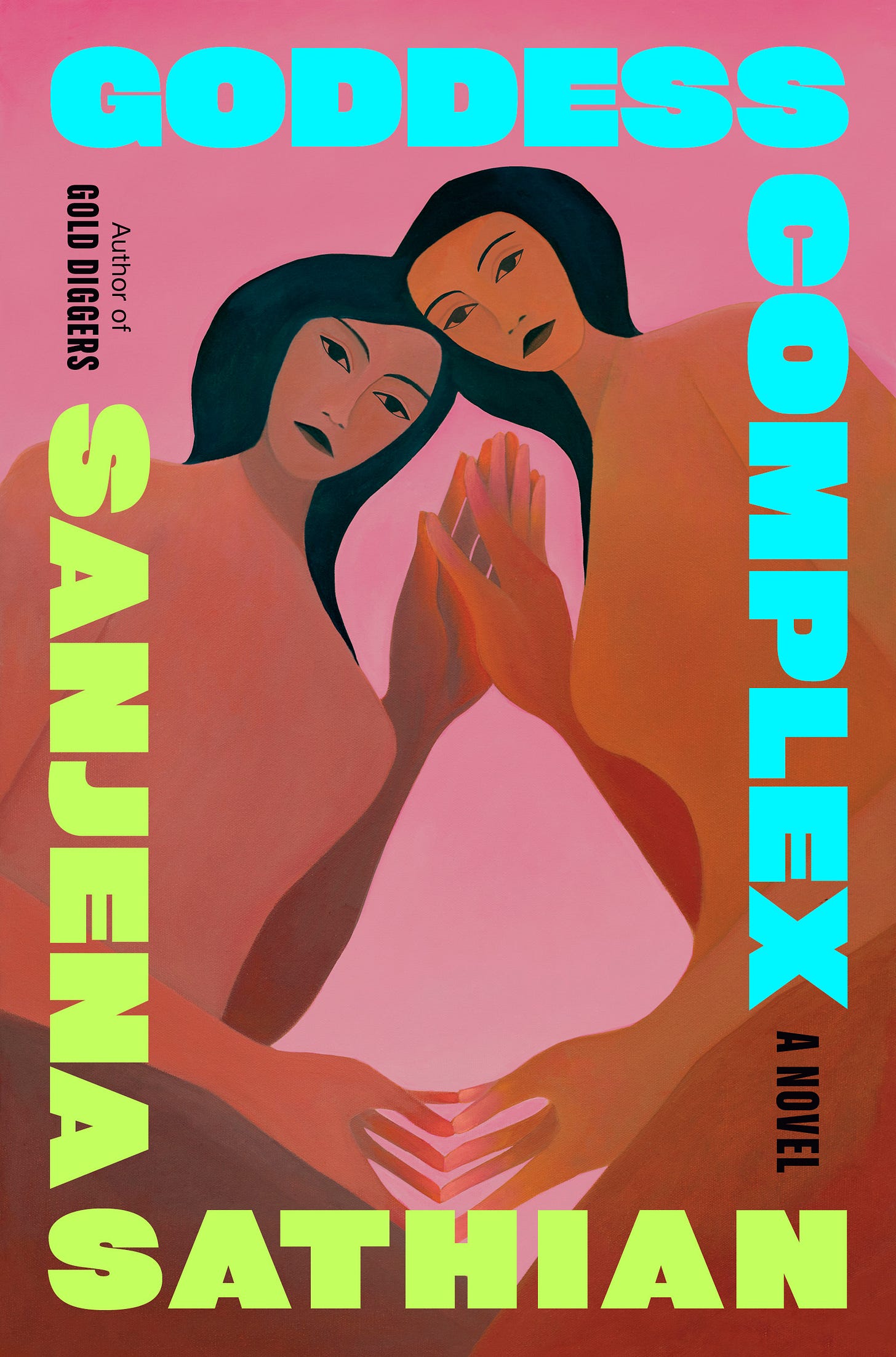Processing: Sanjena Sathian on motherhood, putting herself first, and writing "Goddess Complex"
"I think women often suffer in communitarian societies."
✨Internet Cafe is a reader-supported publication. Support our newsletter, which includes Processing, Hot Club News, and more, by becoming a paying subscriber or listing in our new Yasssifieds section ✨
We are currently supported by 4 paying subscribers <3
How do you approach satire in your writing?
I don’t treat anything as sacred.
Being mother is not easy, but not being a mother is even more challenging. We recently spoke with author —who published her sophomore novel, GODDESS COMPLEX last month—about writing (duh), not taking everything so serious, and why reproductive justice expands on procreative choice.
Let’s get into it!
WC: You must be extremely proud of yourself for making it through your sophomore novel, GODDESS COMPLEX!
How has your writing evolved from your first book?
Sanjena: My relationship to realism and my literary voice evolved with Goddess Complex.
My first novel, Gold Diggers, is a socially realist story that is laced with just a bit of magic; the unreal exists to help comment on the real. I had a sense that I was going to write something closer to realism with Goddess Complex, but my initial drafts went too realistic–I felt trapped in my own material, and I couldn’t see it with fresh, clear eyes.
Goddess Complex will appear as straight realism to most readers at first—even autofiction—but inside this realism is something more bizarre and uncanny. So, though both my books straddle realism and non-realism, in Goddess Complex, I accessed the slightly unreal through the real, whereas in the first book, I found the real through the unreal.
On voice: I wrote Gold Diggers from a male POV.
On the other hand, Goddess Complex has a female narrator.
Weirdly, it was very difficult for me to write from a female perspective. I’d let myself be very free while writing as a man. It took a while for me to write myself toward a female voice that sounded like me, but once I did, I was so relieved, because I finally had a sense that I’d found out what I sounded like on the page, not just what I sounded like in one book. I admire a lot of novelists who change what they do from book to book, remaining interested in similar topics but taking formal and generic risks.
I hope I’ve made some progress in discovering some of the things that will remain the same across my work, while also leaving space to change.
WC: We know that GODDESS COMPLEX began well into the book and that you originally wanted to write about the main character, Sanjana's sinking relationship with her husband.
What prompted you to pivot your storytelling?
Sanjena: I wrote 150 pages about a bad relationship, as you say. I was then going to jump into the head of a woman who had just left that relationship and was attempting to put her life back together. It turned out that the person on the other side of that relationship was much, much more interesting than the one still in it.
I don’t say that in some kind of “I can buy myself flowers” empowerment way. There was just more outside of that relationship, more to work with–more knowledge, more space, and, crucially, more unanswered questions.
In the end, I also got to keep some of the relationship material.
There are three backstory chapters in the first part that are interspersed with the forward-moving plot, and those three chapters tell the story of a declining relationship. Incidentally, those chapters are funnier than the original material, because I got to tell them through the eyes of a narrator who wasn’t just slowly discovering her husband was an asshole, but was also making peace with his failings and could see both the tragedy and the comedy in their marriage.
WC: You described this book as an “I-novel" in a recent interview.
From a cultural viewpoint, how has your upbringing in a South Asian household inform your ability to write about the self?
Sanjena: I’m interested in the many languages we have for “the self,” across intellectual and religious traditions. I find Freudian ideas of the self fascinating, especially as he writes about them in The Uncanny.
I’m also interested in the Buddhist idea that the self is illusory. In this book, though, I was intentionally defensive about the self, and selfishness, perhaps because I come from a South Asian (and therefore communitarian) background.
I think women often suffer in communitarian societies. It’s well and good to say that the Western nuclear family is flawed, but many people who are overly sentimental about South Asian “values” will extoll a joint family as an alternative, and in joint families–multiple generations living under one roof–guess who’s usually doing all the housework?
For me, individuating against the collective was essential. It was also definitionally selfish. Did it make me more American and less Indian? Eh.
But mostly I just feel: It’s all kind of a headfuck, and I try to make jokes about this in the book—Sanjana, the narrator, gets stuck every time she tries to define the self, and herself. Does she want to be alone, or is she lonely when she’s alone? Does she want a white therapist who will treat her as an individual and treat her family hangups as pathological, or would she like an Asian American therapist who reduces everything about her to her family ties? Would she like to live in a commune? Does not wanting to live on a commune make her a Western capitalist pig? Are there any good answers to any of this, or is every attempt to define the self all just a comedy of errors?
WC: Speaking of comedy, how do you approach satire? How can a writer incorporate humor or be playful with a subject that is generally treated as sacred or serious? In the case of GODDESS COMPLEX, motherhood.
Sanjena: I don’t treat anything as sacred, so that’s a starting point.
I find the hushed tones that some people want to use to discuss literature deeply boring and also fundamentally dishonest; literature is supposed to be about and to reflect life, and life can be sad and fucked up but it’s also often funny and weird.
That attitude—that comedy is realism— shapes my work. Whatever language we use to describe comic fiction, I don’t think satire is un-serious—just check out the work of Percival Everett or Helen DeWitt or Jordan Peele, etc.
Satire can be deeply serious (and deeply political) because it can shake us loose from our normal beliefs. It is a form of defamiliarization, in the Viktor Shklovskyan sense: it helps us see the world anew.
WC: There’s a larger discussion around “reproductive choice” versus “reproductive justice.” Where does GODDESS COMPLEX stand in that conversation, and why was it important for you to explore these themes in your latest work?
Sanjena: I wrote a book that is in part about abortion, and about a woman who desperately wants to control her own body. She’s terminated a pregnancy, a pregnancy which was incredibly violating. Freedom, for Sanjana, means refusing childbearing. But for other characters in the novel, not being able to get pregnant is violating in its own way; these characters feel just as out of control, just as betrayed by their own bodies—not to mention their partners, the larger fertility industry, etc.—as my narrator does.
So in that sense, writing characters who want very different things was a way of thinking about not just reproductive rights (the narrow right to choose not to have a child) but broader reproductive justice (the right to choose not to have a child, or to parent the children one wants or already has).
I didn’t set out to think about the politics of this book schematically, though. I just knew that though the narrator was going to have very strong opinions and aversions to childbearing, the book would be one-note if I didn’t also invite in the voices of characters who could complicate the narrator’s sense of self.
I mention this to offer one way to think about writing “political” fiction. Politics is personal, so we can access the political through character, and broaden the politics of our novels by embracing polyphony.
You can follow more of Sanjena’s work on Substack and Instagram.
Til next time!
writers club 🧡








